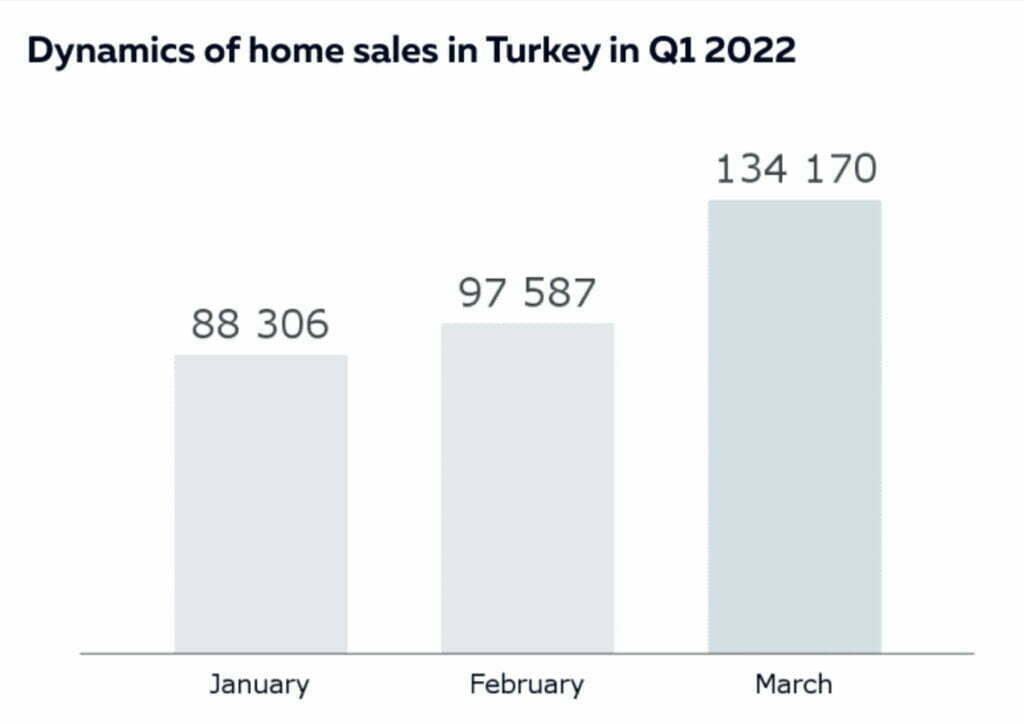The Turkish real estate market has been a hot topic in recent years, attracting attention from both domestic and foreign buyers. With its diverse landscape, rich history, and attractive cost of living, Turkey has become a popular destination for those looking to invest in property.
In this article, we’ll dive deep into the Turkish real estate market, exploring its size, the foreign buyers driving demand, the impact of economic inflation, and the market’s future in 2023.
Table of Contents
Turkish Real Estate Market Overview:

The Turkish real estate market has experienced significant growth in recent years, with domestic and foreign investors showing increasing interest in the country’s property market.
This section will provide a comprehensive overview of the Turkish real estate market, including key trends, investment opportunities, and potential challenges.
The country’s robust economic growth is one of the main drivers of the Turkish real estate market.
Turkey has a diverse economy that includes manufacturing, agriculture, and services, and it has a large and growing population of over 84 million people.
In addition, the country’s location at the crossroads of Europe and Asia makes it an attractive destination for foreign investment.
Another factor contributing to the growth of the Turkish real estate market is the government’s efforts to promote the sector.
In recent years, the government has implemented several initiatives to encourage investment in real estate, including tax breaks and developer grants.
These efforts have helped to create a favorable environment for real estate investment, which has, in turn, fueled demand for both residential and commercial properties.
One of the most popular areas for real estate investment in Turkey is the Istanbul region. Istanbul is the country’s largest city and economic hub, and it is home to a wide range of property types, including apartments, villas, and commercial buildings.
The city’s strong economy and its cultural and historic attractions make it a popular destination for both domestic and foreign buyers.
Another area that has seen significant growth in the Turkish real estate market is the coastal region, which includes popular tourist destinations like Antalya and Bodrum.
These areas have a high demand for vacation homes and rental properties, and they have attracted many foreign buyers in recent years.
There are several investment opportunities in the Turkish real estate market, including residential and commercial properties. For residential properties, the most popular options are apartments and villas, which can be found in a range of price points to suit different budgets. There is also a strong demand for rental properties, particularly in Istanbul and coastal regions, which can offer good returns for investors.
For commercial properties, the most promising sectors are office space, retail, and hospitality. The Istanbul region is beautiful for office space, as it is home to many major international companies. Retail properties, including shopping centers and stores, are also in demand in Turkey, particularly in the major cities. Finally, the hospitality sector, including hotels and resorts, is also a popular investment option in the coastal region, attracting many tourists each year.
While the Turkish real estate market offers many investment opportunities, there are also potential challenges that investors should be aware of. One of the main risks is the potential for economic instability, as the country has a history of economic fluctuations. In addition, there are also regulatory and legal risks to consider, as the real estate sector in Turkey is subject to complex rules and regulations that can be difficult for foreign investors to navigate.
Despite these challenges, the Turkish real estate market is expected to grow in the coming years, with domestic and foreign investors showing increasing interest in the sector. With its diverse economy, attractive location, and favorable investment environment, Turkey offers a range of opportunities for those looking to invest in real estate.
Turkey Residential Real Estate Market Size:

The Turkish residential real estate market is large and significantly impacts the country’s economy. According to data from TUIK (Turkish Statistical Institute), there are 22 million housing units in Turkey, around 70% being owner-occupied and 30% being rental properties. Turkey’s demand for residential properties is strong, with TUIK reporting 667,000 house sales in the first quarter of 2021. Several factors drive this demand, including a growing population, a rising middle class, and an influx of foreign buyers. These factors contribute to the overall size and importance of the Turkish residential real estate market.
In addition to the strong demand for residential properties, the Turkish real estate market also benefits from a relatively low cost of living compared to other European countries. This has made it an attractive destination for foreign investors and retirees, who are attracted by the lower cost of living and the country’s cultural and historical attractions.
The Turkish government has also implemented several measures to encourage the development of the real estate market, including tax incentives and the liberalization of foreign investment regulations. These measures have helped to boost further demand for residential properties and commercial properties such as office buildings and shopping centers.
Overall, the Turkish residential real estate market is essential to the country’s economy and is expected to continue growing in the coming years.
Russians and Ukrainians are in the Turkish real estate market:
As mentioned above, Russia and Ukraine are among the top foreign buyers in the Turkish real estate market. In 2020, these countries accounted for 22% of all foreign property purchases in Turkey.
One reason for this high level of interest is the close cultural and economic ties between Turkey and these countries. In addition, the cost of living in Turkey is relatively low compared to other popular European destinations, making it an attractive option for Russian and Ukrainian buyers.
The Turkish real estate market also offers an excellent opportunity for these buyers to diversify their investment portfolios, as the country’s economy has remained relatively stable despite global economic challenges.
The impact of economic inflation on the real estate market:
Like any market, the Turkish real estate market is subject to economic forces such as inflation. Inflation can significantly impact the cost of properties, with higher inflation leading to higher prices and lower inflation leading to lower prices.
In recent years, Turkey has experienced relatively high inflation levels, with the annual rate reaching 15.7% in 2018. This has had a corresponding effect on property prices, with the cost of residential and commercial properties increasing.
However, the Central Bank of Turkey has taken steps to address this issue, such as raising interest rates and tightening monetary policy. As a result, inflation has been on a downward trend recently, dropping to 8.9% in 2020 and 7.3% in the first quarter of 2021.
While inflation can present challenges for the real estate market, it can also present opportunities. For example, a crisis in the market can create buying opportunities for those who can weather the storm and have the capital to invest. In the long term, a stable economic environment can lead to increased demand for real estate and higher property values.
Istanbul real estate market:
Istanbul is the largest city in Turkey and has a population of over 15 million people. The real estate market in Istanbul has experienced significant growth in recent years, with increasing demand for residential and commercial properties.
The city’s strong economic growth is one of the main drivers of the Istanbul real estate market. Istanbul is a significant economic hub in Turkey, with a diverse range of industries, including finance, tourism, and manufacturing. This economic growth has attracted domestic and foreign investors to the city, leading to increased demand for real estate.
Another factor contributing to the growth of the Istanbul real estate market is the city’s increasing population. Istanbul has a high birth rate and young people, leading to more housing demand. In addition, the city is a popular destination for immigrants and expats, further increasing the demand for housing.
The Istanbul real estate market offers a variety of options for buyers, including apartments, villas, and commercial properties. Prices for real estate in Turkey / Istanbul vary depending on the location and type of property, but prices have generally increased in recent years.
The city’s central districts, such as Beyoğlu and Şişli, tend to be more expensive, while prices are lower in the outer suburbs.
Overall, the Istanbul real estate market is dynamic and growing, with solid demand for residential and commercial properties. With its strong economic growth, a diverse range of industries, and increasing population, Istanbul is an attractive destination for real estate investors.
Is There a Bubble in The Real Estate Market of Istanbul?
There has been some concern in recent years about the possibility of a real estate bubble in Istanbul, with some experts pointing to rising property prices and increasing demand as potential warning signs.
However, it’s important to note that the real estate market is complex, and many factors can influence demand and prices.
While it’s always possible that a bubble could develop in any market, it’s not a given, and it’s difficult to predict with certainty.
One factor that could mitigate the risk of a bubble in the Istanbul real estate market is the strong demand for properties in the city.
As mentioned earlier, Istanbul has a growing population and is a significant economic hub, likely to continue driving demand for housing in the long term.
Supply and demand in Istanbul real estate market:
Like any market, the Istanbul real estate market is driven by supply and demand. When demand for properties is high and supply is limited, prices tend to rise. Conversely, prices tend to fall when demand is low and supply is abundant.
Currently, demand for properties in Istanbul is strong, with TUIK reporting 442,000 house sales in the city in 2020.
This demand will likely continue in the long term, thanks to the city’s growing population and economic importance.
However, it’s important to note that the Istanbul real estate market is not immune to economic cycles and external factors.
For example, a recession or an increase in the supply of properties could lead to a decrease in demand and a corresponding price drop.
The Future of The Turkish Real Estate Market 2023:

The future of the real estate in Turkey 2023 looks bright. Despite facing some challenges in recent years, the market has shown resilience and a strong ability to bounce back.
One of the main factors contributing to the positive outlook for the Turkish real estate market is the country’s strong economic growth. Turkey has a diverse and rapidly growing economy with a strong focus on tourism, manufacturing, and trade.
This economic growth is expected to continue in the coming years, providing a solid foundation for the real estate market.
Another factor that bodes well for the future of the Turkish real estate market is the government’s commitment to improving the country’s infrastructure. The government has been investing heavily in transportation, energy, and communication infrastructure, making it easier for people to live, work, and do business in Turkey.
This will likely lead to increased demand for housing and commercial properties, driving up property values.
The Turkish real estate market also benefits from the country’s favorable location. Turkey is situated at the crossroads of Europe, Asia, and the Middle East, making it an attractive destination for investors and tourists.
This, combined with the country’s rich cultural heritage and stunning natural beauty, makes it a highly desirable place to live and work.
Finally, several government initiatives encourage investment in the sector to boost the Turkish real estate market.
These initiatives include tax breaks, other incentives for developers and buyers, and efforts to streamline the property purchase process and reduce bureaucracy.
Overall, the future of the Turkish real estate market looks bright, with strong economic growth, improved infrastructure, a favorable location, and supportive government policies all contributing to its positive outlook.
So, the Turkish real estate market is expected to grow and thrive in the coming years, providing opportunities for investors and homeowners alike.
Conclusion:
The Turkish real estate market is a dynamic and diversified market with strong demand from domestic and foreign buyers. Despite some economic challenges, the market has remained stable and is expected to continue growing in the coming years.
Whether you are a foreign investor looking for a new opportunity or a buyer looking to own a residential property, the Turkish real estate market has something for everyone.












